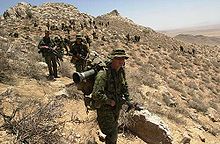 Many in the military have a difficult time integrating back into society once they leave military service. This was probably not as noticeable is previous decades when we had the draft, because most everyone assumed military service was just a bus stop on the road of life for men.
Many in the military have a difficult time integrating back into society once they leave military service. This was probably not as noticeable is previous decades when we had the draft, because most everyone assumed military service was just a bus stop on the road of life for men.
It is quite a bit different today with an all volunteer military that includes both men and women. They volunteer for duty and most enlist knowing they may eventually be placed somewhere in a combat zone. With high unemployment on the home front, the mental anguish that can come from war time deployment, and leaving the world of military benefits, the consideration to join civilian life, particularly for those who contemplated a career in the military, can be stressful. In my next few articles we’ll look at transitional considerations.
The complexities of life affect the transition process
We live in a fast-paced world with increasingly more economic challenges. Everything seems to happen much faster. Time spans seem shorter; evolution daily. It has become an age of sophisticated technology. The military on the other hand has a long history of tradition, and even though it has adapted technology to weaponry, communications, and training, it has steadfastly maintained the bureaucratic decorum that remains the hallmark of military service.
Service in any branch of the military prepares a soldier for a specific MOS (Military Occupation Specialty), and unless cross-trained, that becomes “the employment”, so to speak, by the “employer”…the military. Compensation is governed by the tradition of “time and grade”. It may take a while to reach a “comfort level”, particularly if a spouse and children are involved, but there is some degree of financial security and benefits.
Civilian life is much different in that there are many educational choices, many employment potentials, many employers, and a wide range of compensation plans far more lucrative than being on the payroll of the Department of Defense. With employment at a high level of uncertainty outside the armed services, it is not a cut and dry choice to jump into the fray. In short, the transition to civilian can be like moving to a different planet.
The many things to consider in making the transition
- Employment
- Housing
- School benefits (whether going back to school or finding a school for the children)
- Medical/Dental coverage
- GI Loans
- On going support services for those physically disabled from military service also have to be addressed
- Dealing with emotional and mental disabilities from combat must also be confronted
We will continue analyzing the transition process in the next series of articles and look at what can be done to make the process as smooth as possible for those making the leap.

Following his service in the Marine Corps Ed Mattson built a diverse career in business in both sales/marketing and management. He is a medical research specialist and published author. His latest book is Down on Main Street: Searching for American Exceptionalism
Ed is currently Development Director of the National Guard Bureau of International Affairs-State Partnership Program, Fundraising Coordinator for the Warrior2Citizen Project, and Managing Partner of Center-Point Consultants in North Carolina.
Mr. Mattson is a noted speaker and has addressed more than 3000 audiences in 42 states and 5 foreign countries. He has been awarded the Order of the Sword by American Cancer Society, is a Rotarian Paul Harris Fellow and appeared on more than 15 radio and television talk-shows.
ATTENTION READERS
We See The World From All Sides and Want YOU To Be Fully InformedIn fact, intentional disinformation is a disgraceful scourge in media today. So to assuage any possible errant incorrect information posted herein, we strongly encourage you to seek corroboration from other non-VT sources before forming an educated opinion.
About VT - Policies & Disclosures - Comment Policy




